Contract Law Analysis: Invitations, Consideration, and Contracts
VerifiedAdded on 2023/01/16
|11
|2629
|80
Report
AI Summary
This report provides a comprehensive analysis of contract law, beginning with the distinction between public and private law, and an explanation of the principle of precedent within the English legal system, including the doctrine of Stare Decisis. The report then delves into a case study involving Empire Cruise Ltd, Sunrise Cruise Ltd, and LBSU Ltd, examining the legal nature of advertisements as invitations to treat, the concept of consideration, and the formation of binding contracts. The analysis addresses whether Empire's advertisement constituted an offer, the validity of consideration provided by Sunrise, and whether LBSU and Sunrise entered into binding contracts with Empire. The case study applies relevant legal principles and precedents to determine the contractual obligations of each party, offering a detailed examination of the elements required for a valid agreement.
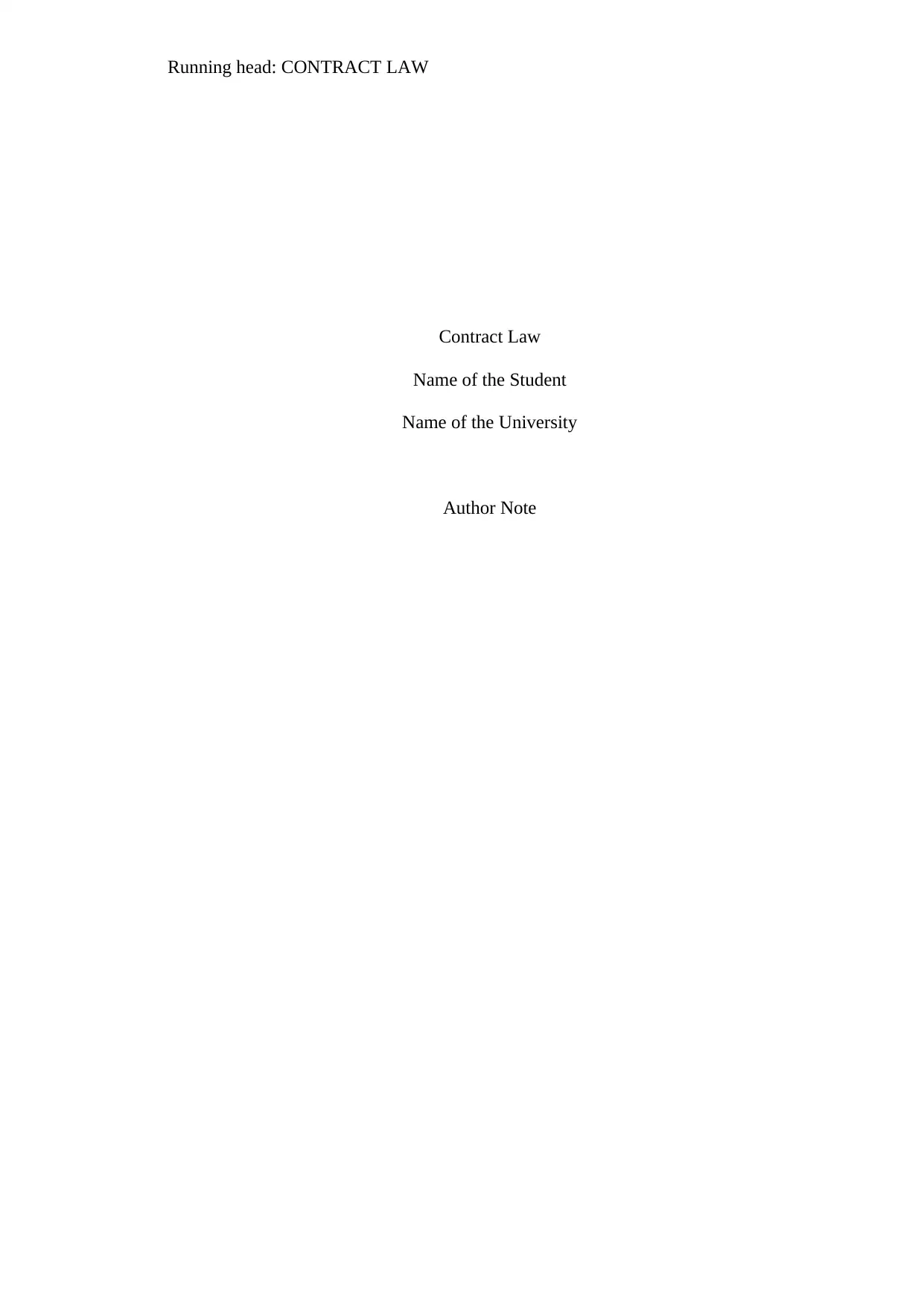
Running head: CONTRACT LAW
Contract Law
Name of the Student
Name of the University
Author Note
Contract Law
Name of the Student
Name of the University
Author Note
Paraphrase This Document
Need a fresh take? Get an instant paraphrase of this document with our AI Paraphraser
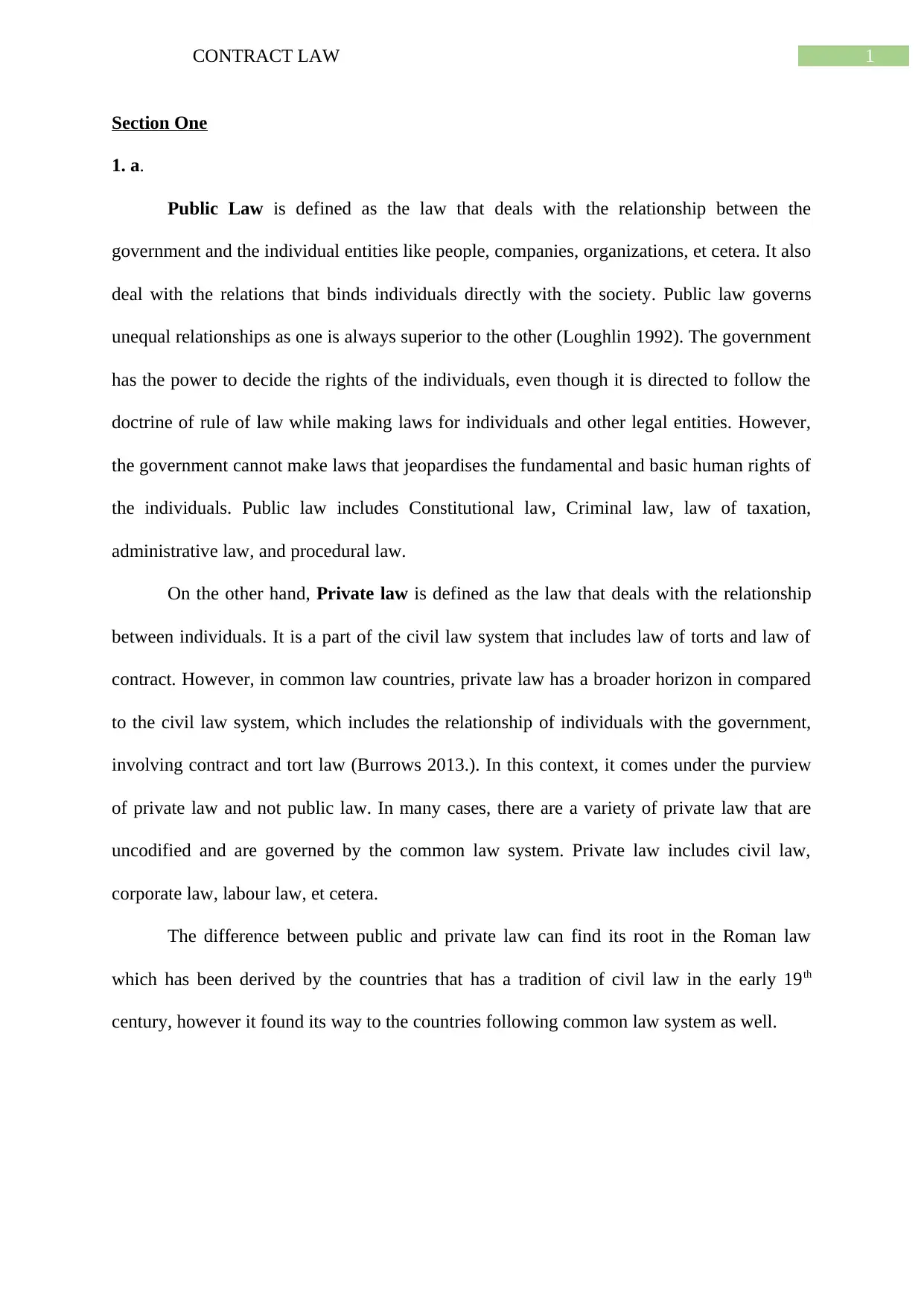
1CONTRACT LAW
Section One
1. a.
Public Law is defined as the law that deals with the relationship between the
government and the individual entities like people, companies, organizations, et cetera. It also
deal with the relations that binds individuals directly with the society. Public law governs
unequal relationships as one is always superior to the other (Loughlin 1992). The government
has the power to decide the rights of the individuals, even though it is directed to follow the
doctrine of rule of law while making laws for individuals and other legal entities. However,
the government cannot make laws that jeopardises the fundamental and basic human rights of
the individuals. Public law includes Constitutional law, Criminal law, law of taxation,
administrative law, and procedural law.
On the other hand, Private law is defined as the law that deals with the relationship
between individuals. It is a part of the civil law system that includes law of torts and law of
contract. However, in common law countries, private law has a broader horizon in compared
to the civil law system, which includes the relationship of individuals with the government,
involving contract and tort law (Burrows 2013.). In this context, it comes under the purview
of private law and not public law. In many cases, there are a variety of private law that are
uncodified and are governed by the common law system. Private law includes civil law,
corporate law, labour law, et cetera.
The difference between public and private law can find its root in the Roman law
which has been derived by the countries that has a tradition of civil law in the early 19th
century, however it found its way to the countries following common law system as well.
Section One
1. a.
Public Law is defined as the law that deals with the relationship between the
government and the individual entities like people, companies, organizations, et cetera. It also
deal with the relations that binds individuals directly with the society. Public law governs
unequal relationships as one is always superior to the other (Loughlin 1992). The government
has the power to decide the rights of the individuals, even though it is directed to follow the
doctrine of rule of law while making laws for individuals and other legal entities. However,
the government cannot make laws that jeopardises the fundamental and basic human rights of
the individuals. Public law includes Constitutional law, Criminal law, law of taxation,
administrative law, and procedural law.
On the other hand, Private law is defined as the law that deals with the relationship
between individuals. It is a part of the civil law system that includes law of torts and law of
contract. However, in common law countries, private law has a broader horizon in compared
to the civil law system, which includes the relationship of individuals with the government,
involving contract and tort law (Burrows 2013.). In this context, it comes under the purview
of private law and not public law. In many cases, there are a variety of private law that are
uncodified and are governed by the common law system. Private law includes civil law,
corporate law, labour law, et cetera.
The difference between public and private law can find its root in the Roman law
which has been derived by the countries that has a tradition of civil law in the early 19th
century, however it found its way to the countries following common law system as well.
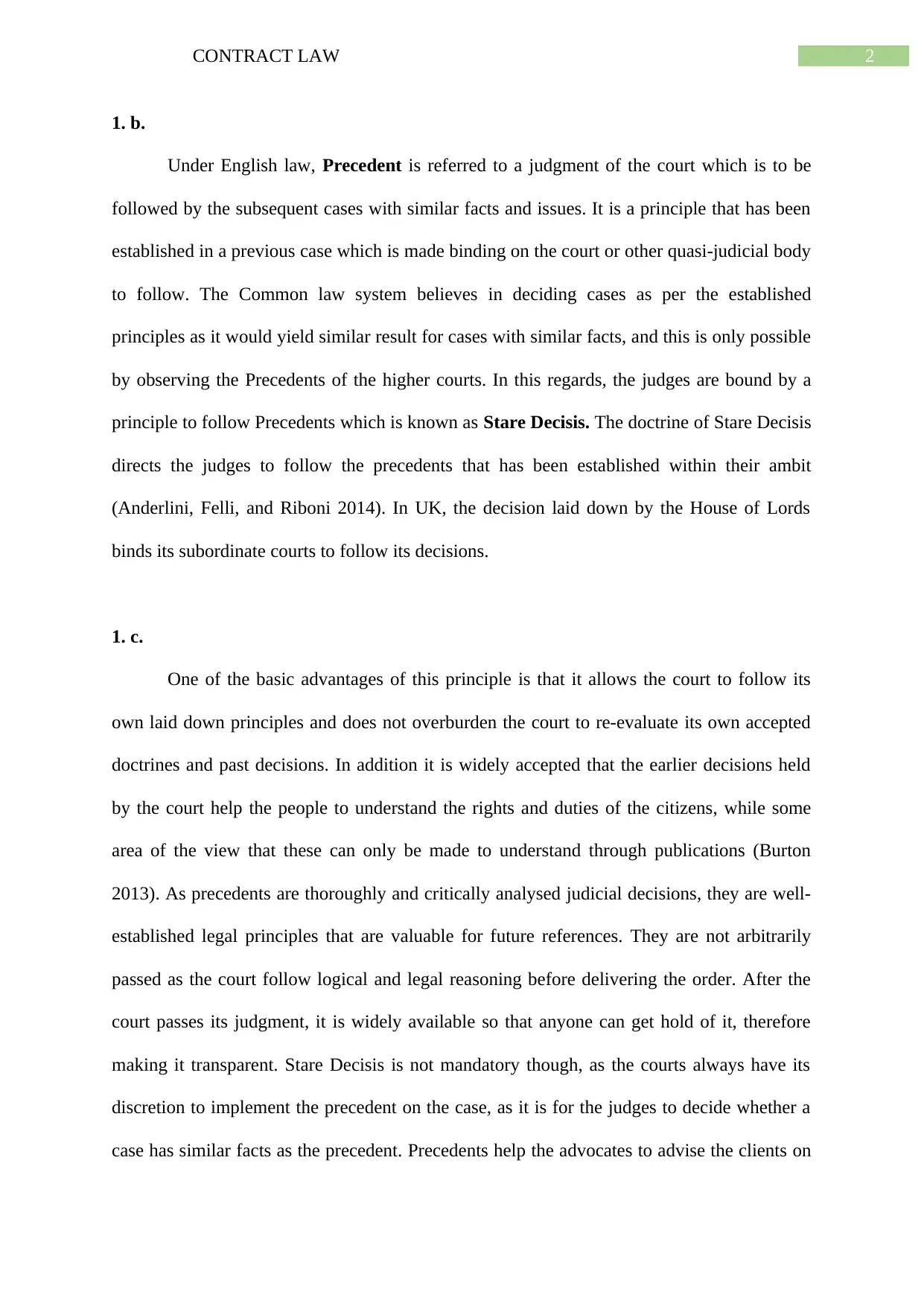
2CONTRACT LAW
1. b.
Under English law, Precedent is referred to a judgment of the court which is to be
followed by the subsequent cases with similar facts and issues. It is a principle that has been
established in a previous case which is made binding on the court or other quasi-judicial body
to follow. The Common law system believes in deciding cases as per the established
principles as it would yield similar result for cases with similar facts, and this is only possible
by observing the Precedents of the higher courts. In this regards, the judges are bound by a
principle to follow Precedents which is known as Stare Decisis. The doctrine of Stare Decisis
directs the judges to follow the precedents that has been established within their ambit
(Anderlini, Felli, and Riboni 2014). In UK, the decision laid down by the House of Lords
binds its subordinate courts to follow its decisions.
1. c.
One of the basic advantages of this principle is that it allows the court to follow its
own laid down principles and does not overburden the court to re-evaluate its own accepted
doctrines and past decisions. In addition it is widely accepted that the earlier decisions held
by the court help the people to understand the rights and duties of the citizens, while some
area of the view that these can only be made to understand through publications (Burton
2013). As precedents are thoroughly and critically analysed judicial decisions, they are well-
established legal principles that are valuable for future references. They are not arbitrarily
passed as the court follow logical and legal reasoning before delivering the order. After the
court passes its judgment, it is widely available so that anyone can get hold of it, therefore
making it transparent. Stare Decisis is not mandatory though, as the courts always have its
discretion to implement the precedent on the case, as it is for the judges to decide whether a
case has similar facts as the precedent. Precedents help the advocates to advise the clients on
1. b.
Under English law, Precedent is referred to a judgment of the court which is to be
followed by the subsequent cases with similar facts and issues. It is a principle that has been
established in a previous case which is made binding on the court or other quasi-judicial body
to follow. The Common law system believes in deciding cases as per the established
principles as it would yield similar result for cases with similar facts, and this is only possible
by observing the Precedents of the higher courts. In this regards, the judges are bound by a
principle to follow Precedents which is known as Stare Decisis. The doctrine of Stare Decisis
directs the judges to follow the precedents that has been established within their ambit
(Anderlini, Felli, and Riboni 2014). In UK, the decision laid down by the House of Lords
binds its subordinate courts to follow its decisions.
1. c.
One of the basic advantages of this principle is that it allows the court to follow its
own laid down principles and does not overburden the court to re-evaluate its own accepted
doctrines and past decisions. In addition it is widely accepted that the earlier decisions held
by the court help the people to understand the rights and duties of the citizens, while some
area of the view that these can only be made to understand through publications (Burton
2013). As precedents are thoroughly and critically analysed judicial decisions, they are well-
established legal principles that are valuable for future references. They are not arbitrarily
passed as the court follow logical and legal reasoning before delivering the order. After the
court passes its judgment, it is widely available so that anyone can get hold of it, therefore
making it transparent. Stare Decisis is not mandatory though, as the courts always have its
discretion to implement the precedent on the case, as it is for the judges to decide whether a
case has similar facts as the precedent. Precedents help the advocates to advise the clients on
⊘ This is a preview!⊘
Do you want full access?
Subscribe today to unlock all pages.

Trusted by 1+ million students worldwide
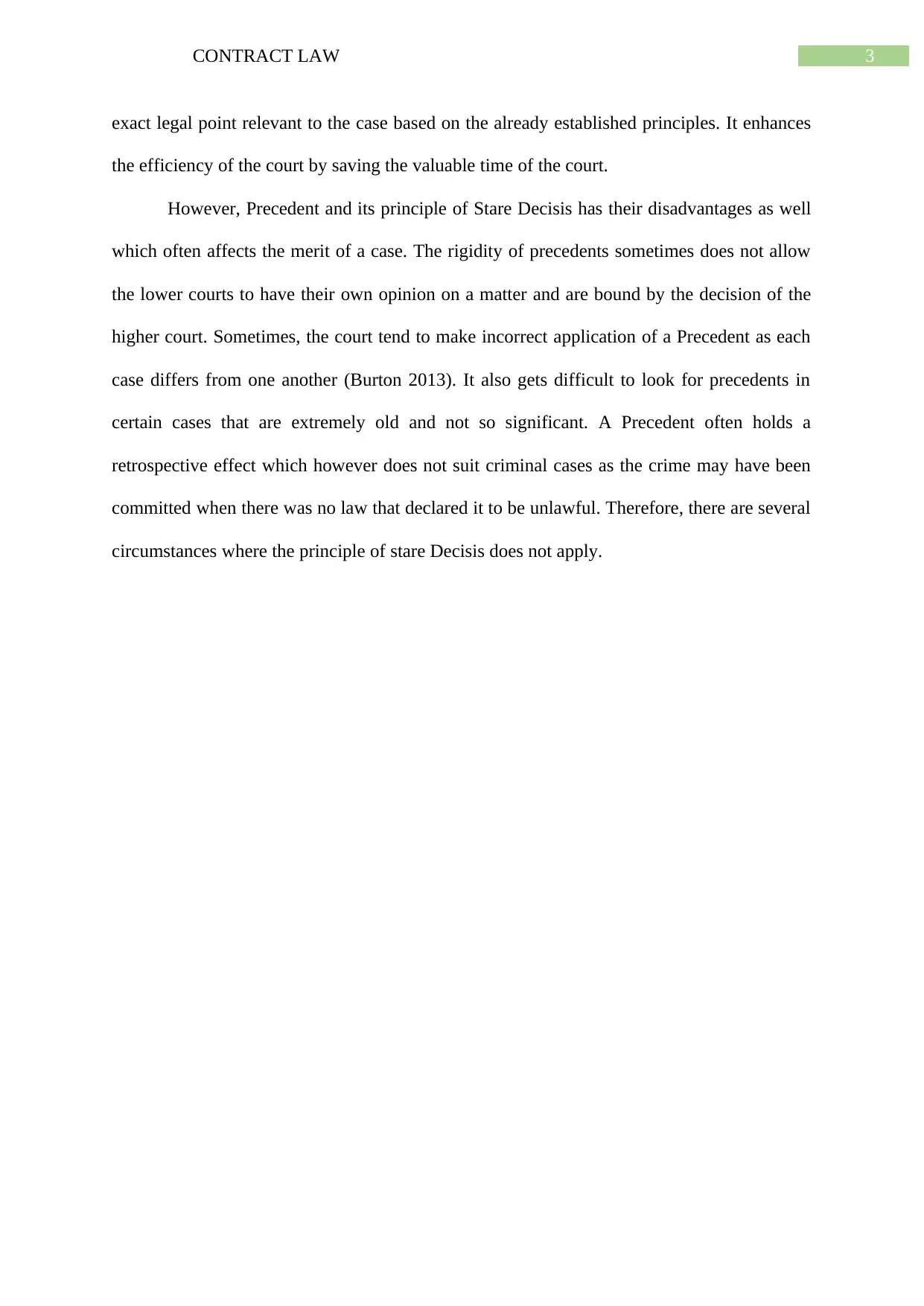
3CONTRACT LAW
exact legal point relevant to the case based on the already established principles. It enhances
the efficiency of the court by saving the valuable time of the court.
However, Precedent and its principle of Stare Decisis has their disadvantages as well
which often affects the merit of a case. The rigidity of precedents sometimes does not allow
the lower courts to have their own opinion on a matter and are bound by the decision of the
higher court. Sometimes, the court tend to make incorrect application of a Precedent as each
case differs from one another (Burton 2013). It also gets difficult to look for precedents in
certain cases that are extremely old and not so significant. A Precedent often holds a
retrospective effect which however does not suit criminal cases as the crime may have been
committed when there was no law that declared it to be unlawful. Therefore, there are several
circumstances where the principle of stare Decisis does not apply.
exact legal point relevant to the case based on the already established principles. It enhances
the efficiency of the court by saving the valuable time of the court.
However, Precedent and its principle of Stare Decisis has their disadvantages as well
which often affects the merit of a case. The rigidity of precedents sometimes does not allow
the lower courts to have their own opinion on a matter and are bound by the decision of the
higher court. Sometimes, the court tend to make incorrect application of a Precedent as each
case differs from one another (Burton 2013). It also gets difficult to look for precedents in
certain cases that are extremely old and not so significant. A Precedent often holds a
retrospective effect which however does not suit criminal cases as the crime may have been
committed when there was no law that declared it to be unlawful. Therefore, there are several
circumstances where the principle of stare Decisis does not apply.
Paraphrase This Document
Need a fresh take? Get an instant paraphrase of this document with our AI Paraphraser
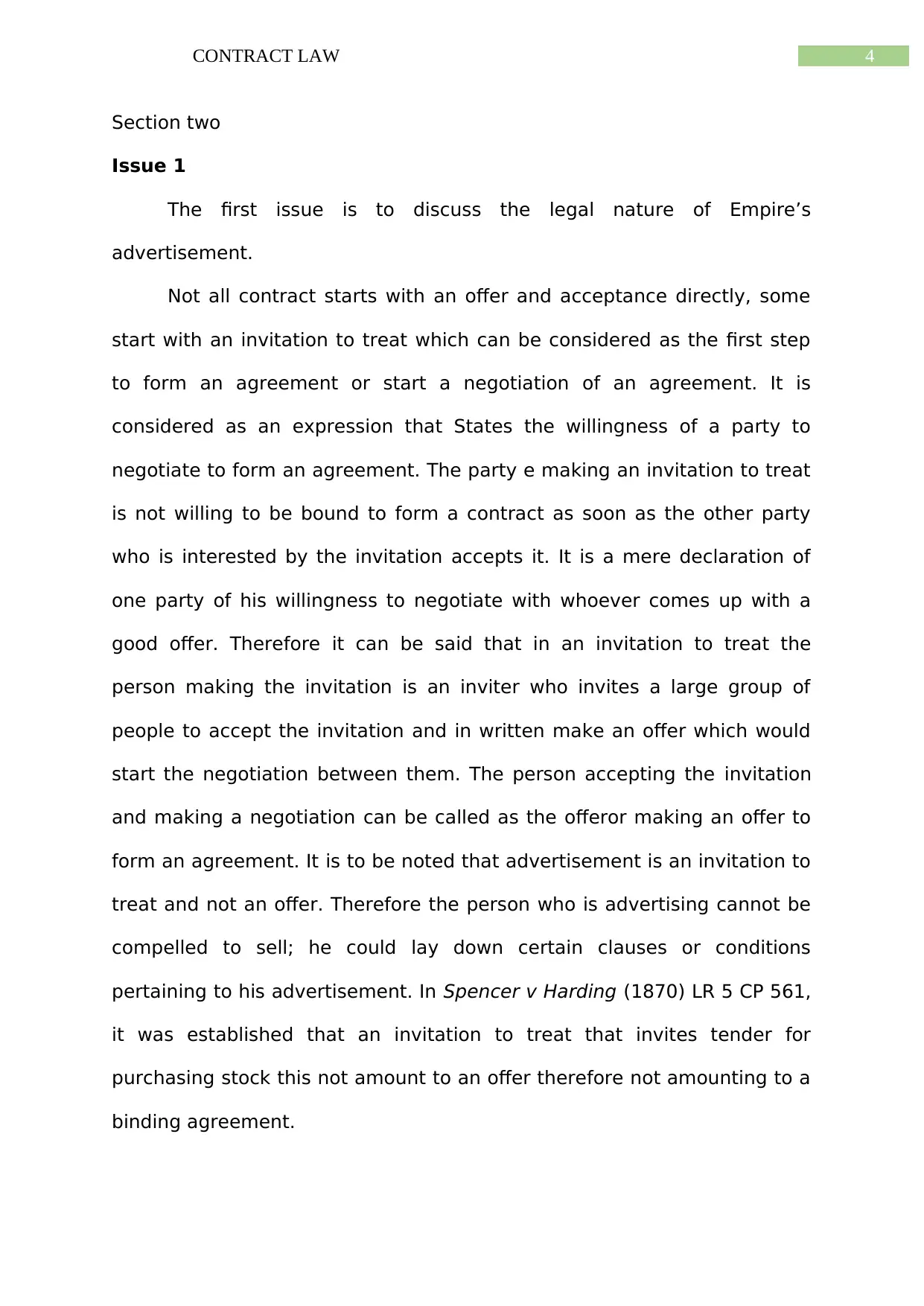
4CONTRACT LAW
Section two
Issue 1
The first issue is to discuss the legal nature of Empire’s
advertisement.
Not all contract starts with an offer and acceptance directly, some
start with an invitation to treat which can be considered as the first step
to form an agreement or start a negotiation of an agreement. It is
considered as an expression that States the willingness of a party to
negotiate to form an agreement. The party e making an invitation to treat
is not willing to be bound to form a contract as soon as the other party
who is interested by the invitation accepts it. It is a mere declaration of
one party of his willingness to negotiate with whoever comes up with a
good offer. Therefore it can be said that in an invitation to treat the
person making the invitation is an inviter who invites a large group of
people to accept the invitation and in written make an offer which would
start the negotiation between them. The person accepting the invitation
and making a negotiation can be called as the offeror making an offer to
form an agreement. It is to be noted that advertisement is an invitation to
treat and not an offer. Therefore the person who is advertising cannot be
compelled to sell; he could lay down certain clauses or conditions
pertaining to his advertisement. In Spencer v Harding (1870) LR 5 CP 561,
it was established that an invitation to treat that invites tender for
purchasing stock this not amount to an offer therefore not amounting to a
binding agreement.
Section two
Issue 1
The first issue is to discuss the legal nature of Empire’s
advertisement.
Not all contract starts with an offer and acceptance directly, some
start with an invitation to treat which can be considered as the first step
to form an agreement or start a negotiation of an agreement. It is
considered as an expression that States the willingness of a party to
negotiate to form an agreement. The party e making an invitation to treat
is not willing to be bound to form a contract as soon as the other party
who is interested by the invitation accepts it. It is a mere declaration of
one party of his willingness to negotiate with whoever comes up with a
good offer. Therefore it can be said that in an invitation to treat the
person making the invitation is an inviter who invites a large group of
people to accept the invitation and in written make an offer which would
start the negotiation between them. The person accepting the invitation
and making a negotiation can be called as the offeror making an offer to
form an agreement. It is to be noted that advertisement is an invitation to
treat and not an offer. Therefore the person who is advertising cannot be
compelled to sell; he could lay down certain clauses or conditions
pertaining to his advertisement. In Spencer v Harding (1870) LR 5 CP 561,
it was established that an invitation to treat that invites tender for
purchasing stock this not amount to an offer therefore not amounting to a
binding agreement.
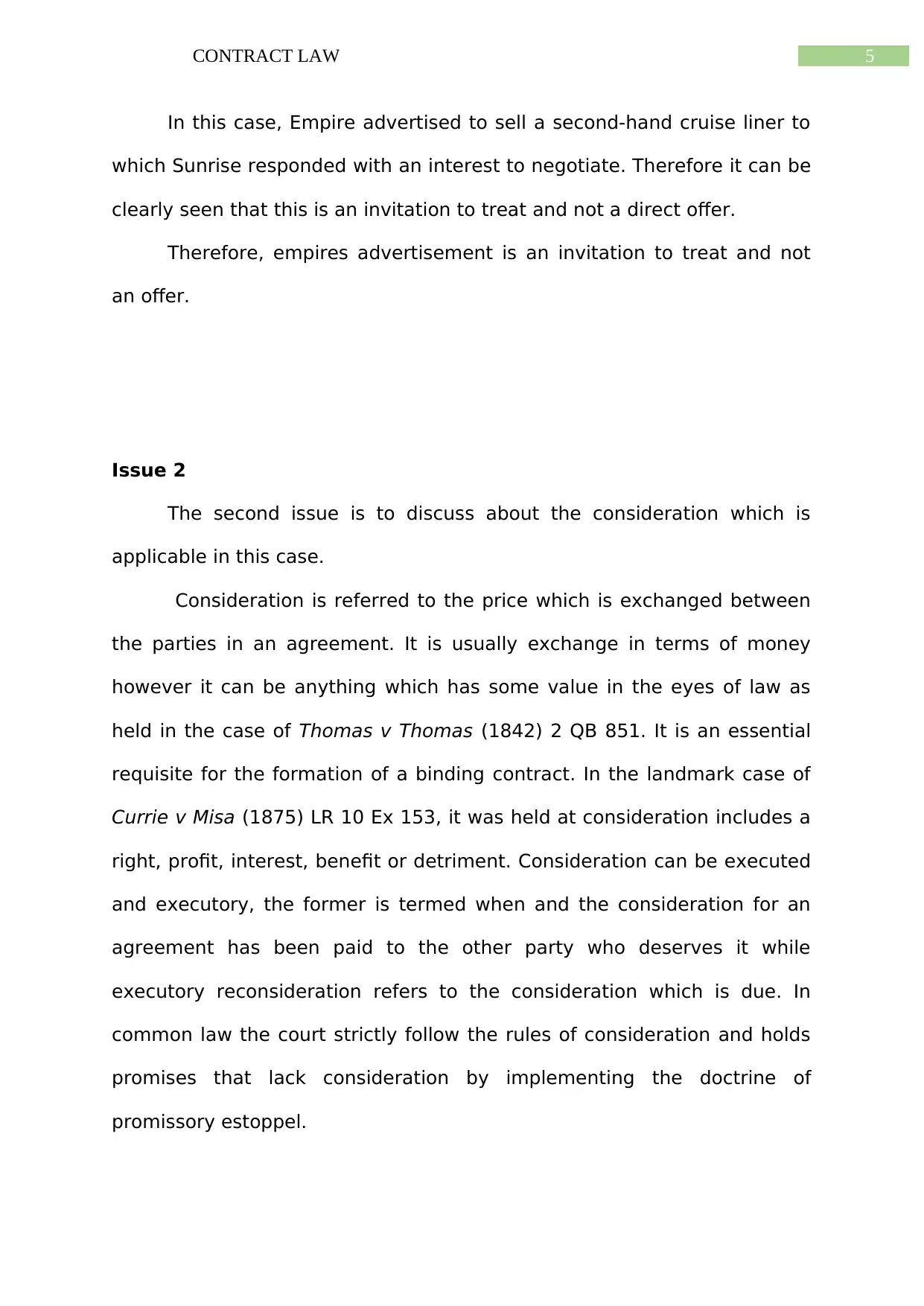
5CONTRACT LAW
In this case, Empire advertised to sell a second-hand cruise liner to
which Sunrise responded with an interest to negotiate. Therefore it can be
clearly seen that this is an invitation to treat and not a direct offer.
Therefore, empires advertisement is an invitation to treat and not
an offer.
Issue 2
The second issue is to discuss about the consideration which is
applicable in this case.
Consideration is referred to the price which is exchanged between
the parties in an agreement. It is usually exchange in terms of money
however it can be anything which has some value in the eyes of law as
held in the case of Thomas v Thomas (1842) 2 QB 851. It is an essential
requisite for the formation of a binding contract. In the landmark case of
Currie v Misa (1875) LR 10 Ex 153, it was held at consideration includes a
right, profit, interest, benefit or detriment. Consideration can be executed
and executory, the former is termed when and the consideration for an
agreement has been paid to the other party who deserves it while
executory reconsideration refers to the consideration which is due. In
common law the court strictly follow the rules of consideration and holds
promises that lack consideration by implementing the doctrine of
promissory estoppel.
In this case, Empire advertised to sell a second-hand cruise liner to
which Sunrise responded with an interest to negotiate. Therefore it can be
clearly seen that this is an invitation to treat and not a direct offer.
Therefore, empires advertisement is an invitation to treat and not
an offer.
Issue 2
The second issue is to discuss about the consideration which is
applicable in this case.
Consideration is referred to the price which is exchanged between
the parties in an agreement. It is usually exchange in terms of money
however it can be anything which has some value in the eyes of law as
held in the case of Thomas v Thomas (1842) 2 QB 851. It is an essential
requisite for the formation of a binding contract. In the landmark case of
Currie v Misa (1875) LR 10 Ex 153, it was held at consideration includes a
right, profit, interest, benefit or detriment. Consideration can be executed
and executory, the former is termed when and the consideration for an
agreement has been paid to the other party who deserves it while
executory reconsideration refers to the consideration which is due. In
common law the court strictly follow the rules of consideration and holds
promises that lack consideration by implementing the doctrine of
promissory estoppel.
⊘ This is a preview!⊘
Do you want full access?
Subscribe today to unlock all pages.

Trusted by 1+ million students worldwide
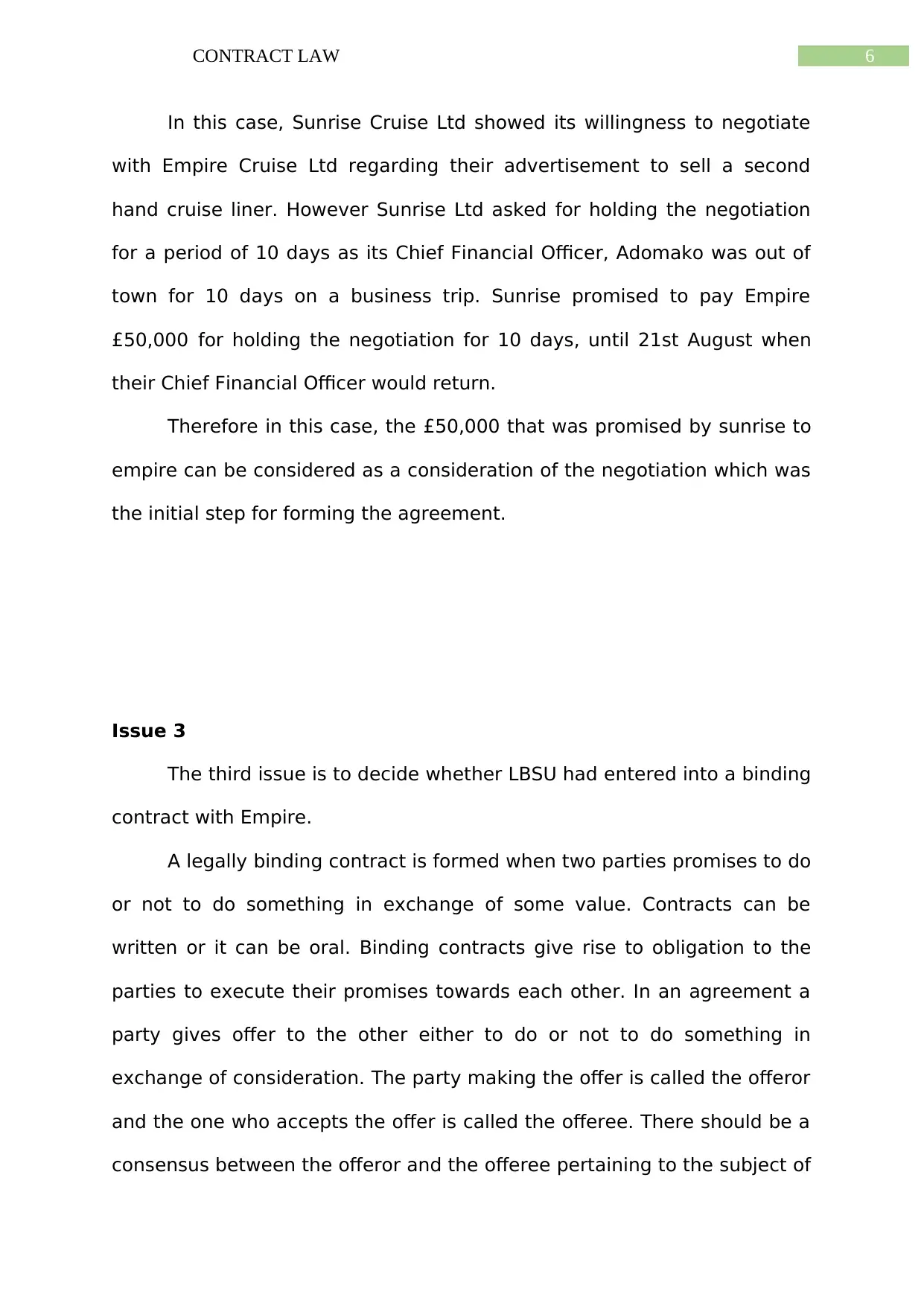
6CONTRACT LAW
In this case, Sunrise Cruise Ltd showed its willingness to negotiate
with Empire Cruise Ltd regarding their advertisement to sell a second
hand cruise liner. However Sunrise Ltd asked for holding the negotiation
for a period of 10 days as its Chief Financial Officer, Adomako was out of
town for 10 days on a business trip. Sunrise promised to pay Empire
£50,000 for holding the negotiation for 10 days, until 21st August when
their Chief Financial Officer would return.
Therefore in this case, the £50,000 that was promised by sunrise to
empire can be considered as a consideration of the negotiation which was
the initial step for forming the agreement.
Issue 3
The third issue is to decide whether LBSU had entered into a binding
contract with Empire.
A legally binding contract is formed when two parties promises to do
or not to do something in exchange of some value. Contracts can be
written or it can be oral. Binding contracts give rise to obligation to the
parties to execute their promises towards each other. In an agreement a
party gives offer to the other either to do or not to do something in
exchange of consideration. The party making the offer is called the offeror
and the one who accepts the offer is called the offeree. There should be a
consensus between the offeror and the offeree pertaining to the subject of
In this case, Sunrise Cruise Ltd showed its willingness to negotiate
with Empire Cruise Ltd regarding their advertisement to sell a second
hand cruise liner. However Sunrise Ltd asked for holding the negotiation
for a period of 10 days as its Chief Financial Officer, Adomako was out of
town for 10 days on a business trip. Sunrise promised to pay Empire
£50,000 for holding the negotiation for 10 days, until 21st August when
their Chief Financial Officer would return.
Therefore in this case, the £50,000 that was promised by sunrise to
empire can be considered as a consideration of the negotiation which was
the initial step for forming the agreement.
Issue 3
The third issue is to decide whether LBSU had entered into a binding
contract with Empire.
A legally binding contract is formed when two parties promises to do
or not to do something in exchange of some value. Contracts can be
written or it can be oral. Binding contracts give rise to obligation to the
parties to execute their promises towards each other. In an agreement a
party gives offer to the other either to do or not to do something in
exchange of consideration. The party making the offer is called the offeror
and the one who accepts the offer is called the offeree. There should be a
consensus between the offeror and the offeree pertaining to the subject of
Paraphrase This Document
Need a fresh take? Get an instant paraphrase of this document with our AI Paraphraser
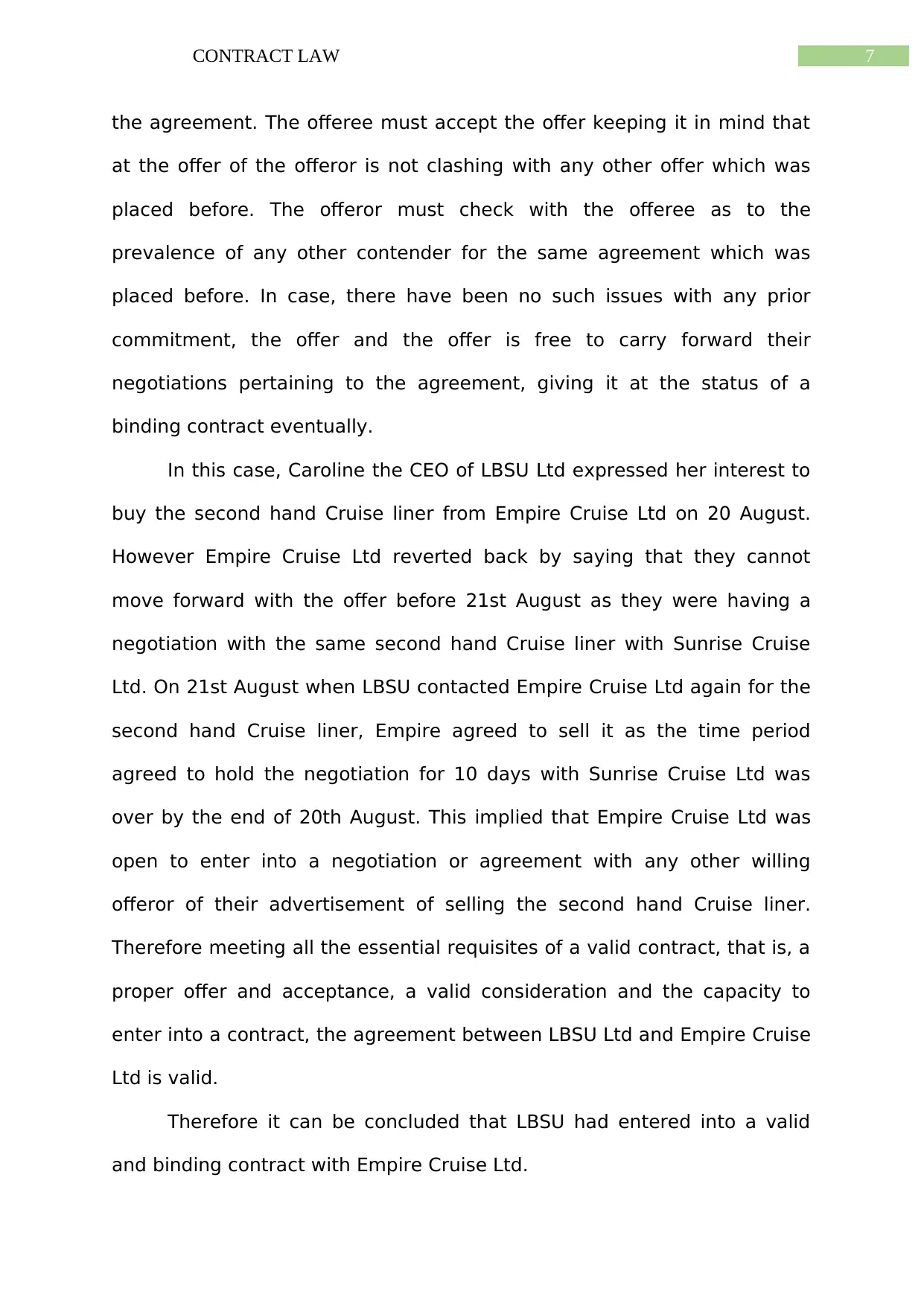
7CONTRACT LAW
the agreement. The offeree must accept the offer keeping it in mind that
at the offer of the offeror is not clashing with any other offer which was
placed before. The offeror must check with the offeree as to the
prevalence of any other contender for the same agreement which was
placed before. In case, there have been no such issues with any prior
commitment, the offer and the offer is free to carry forward their
negotiations pertaining to the agreement, giving it at the status of a
binding contract eventually.
In this case, Caroline the CEO of LBSU Ltd expressed her interest to
buy the second hand Cruise liner from Empire Cruise Ltd on 20 August.
However Empire Cruise Ltd reverted back by saying that they cannot
move forward with the offer before 21st August as they were having a
negotiation with the same second hand Cruise liner with Sunrise Cruise
Ltd. On 21st August when LBSU contacted Empire Cruise Ltd again for the
second hand Cruise liner, Empire agreed to sell it as the time period
agreed to hold the negotiation for 10 days with Sunrise Cruise Ltd was
over by the end of 20th August. This implied that Empire Cruise Ltd was
open to enter into a negotiation or agreement with any other willing
offeror of their advertisement of selling the second hand Cruise liner.
Therefore meeting all the essential requisites of a valid contract, that is, a
proper offer and acceptance, a valid consideration and the capacity to
enter into a contract, the agreement between LBSU Ltd and Empire Cruise
Ltd is valid.
Therefore it can be concluded that LBSU had entered into a valid
and binding contract with Empire Cruise Ltd.
the agreement. The offeree must accept the offer keeping it in mind that
at the offer of the offeror is not clashing with any other offer which was
placed before. The offeror must check with the offeree as to the
prevalence of any other contender for the same agreement which was
placed before. In case, there have been no such issues with any prior
commitment, the offer and the offer is free to carry forward their
negotiations pertaining to the agreement, giving it at the status of a
binding contract eventually.
In this case, Caroline the CEO of LBSU Ltd expressed her interest to
buy the second hand Cruise liner from Empire Cruise Ltd on 20 August.
However Empire Cruise Ltd reverted back by saying that they cannot
move forward with the offer before 21st August as they were having a
negotiation with the same second hand Cruise liner with Sunrise Cruise
Ltd. On 21st August when LBSU contacted Empire Cruise Ltd again for the
second hand Cruise liner, Empire agreed to sell it as the time period
agreed to hold the negotiation for 10 days with Sunrise Cruise Ltd was
over by the end of 20th August. This implied that Empire Cruise Ltd was
open to enter into a negotiation or agreement with any other willing
offeror of their advertisement of selling the second hand Cruise liner.
Therefore meeting all the essential requisites of a valid contract, that is, a
proper offer and acceptance, a valid consideration and the capacity to
enter into a contract, the agreement between LBSU Ltd and Empire Cruise
Ltd is valid.
Therefore it can be concluded that LBSU had entered into a valid
and binding contract with Empire Cruise Ltd.
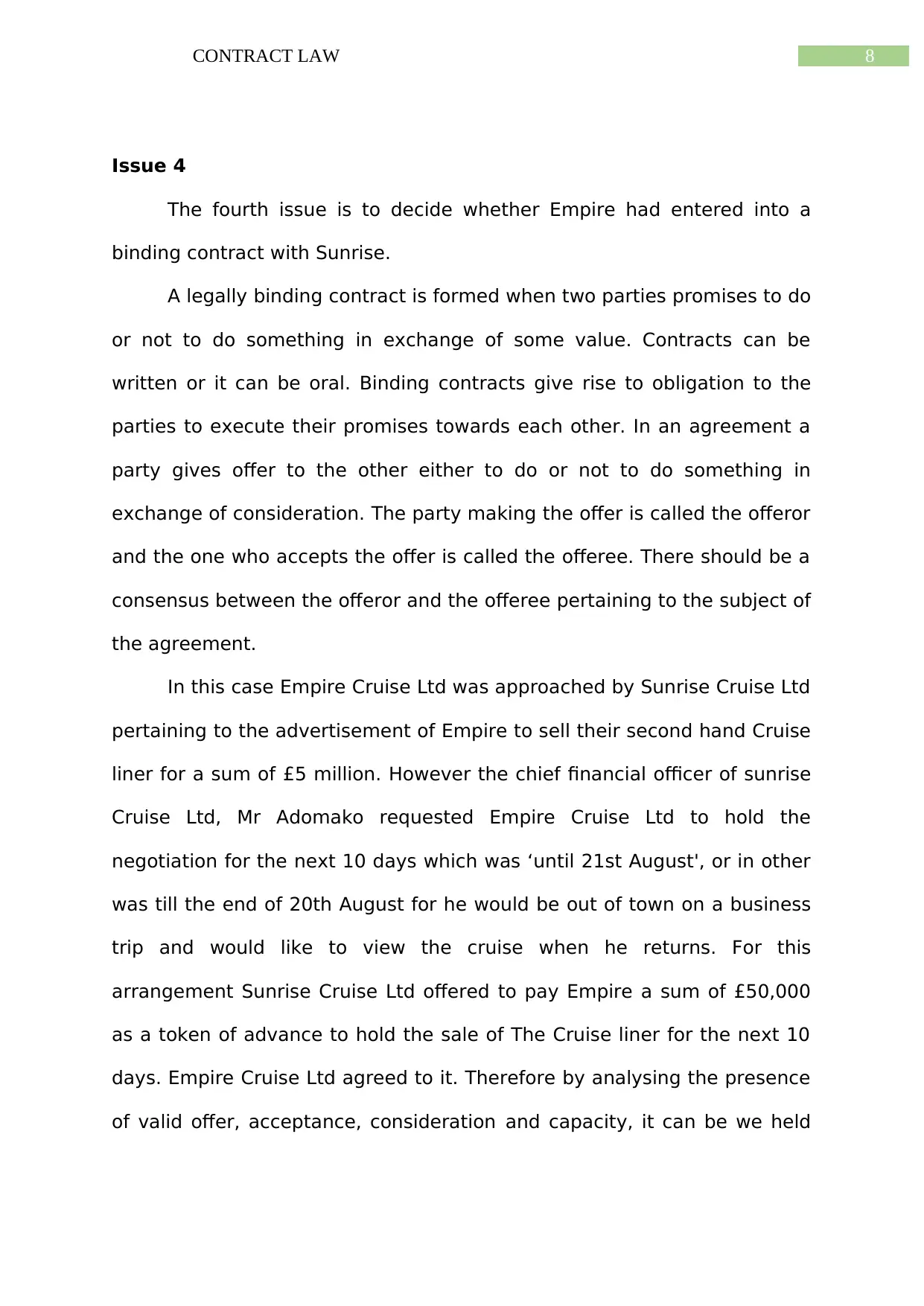
8CONTRACT LAW
Issue 4
The fourth issue is to decide whether Empire had entered into a
binding contract with Sunrise.
A legally binding contract is formed when two parties promises to do
or not to do something in exchange of some value. Contracts can be
written or it can be oral. Binding contracts give rise to obligation to the
parties to execute their promises towards each other. In an agreement a
party gives offer to the other either to do or not to do something in
exchange of consideration. The party making the offer is called the offeror
and the one who accepts the offer is called the offeree. There should be a
consensus between the offeror and the offeree pertaining to the subject of
the agreement.
In this case Empire Cruise Ltd was approached by Sunrise Cruise Ltd
pertaining to the advertisement of Empire to sell their second hand Cruise
liner for a sum of £5 million. However the chief financial officer of sunrise
Cruise Ltd, Mr Adomako requested Empire Cruise Ltd to hold the
negotiation for the next 10 days which was ‘until 21st August', or in other
was till the end of 20th August for he would be out of town on a business
trip and would like to view the cruise when he returns. For this
arrangement Sunrise Cruise Ltd offered to pay Empire a sum of £50,000
as a token of advance to hold the sale of The Cruise liner for the next 10
days. Empire Cruise Ltd agreed to it. Therefore by analysing the presence
of valid offer, acceptance, consideration and capacity, it can be we held
Issue 4
The fourth issue is to decide whether Empire had entered into a
binding contract with Sunrise.
A legally binding contract is formed when two parties promises to do
or not to do something in exchange of some value. Contracts can be
written or it can be oral. Binding contracts give rise to obligation to the
parties to execute their promises towards each other. In an agreement a
party gives offer to the other either to do or not to do something in
exchange of consideration. The party making the offer is called the offeror
and the one who accepts the offer is called the offeree. There should be a
consensus between the offeror and the offeree pertaining to the subject of
the agreement.
In this case Empire Cruise Ltd was approached by Sunrise Cruise Ltd
pertaining to the advertisement of Empire to sell their second hand Cruise
liner for a sum of £5 million. However the chief financial officer of sunrise
Cruise Ltd, Mr Adomako requested Empire Cruise Ltd to hold the
negotiation for the next 10 days which was ‘until 21st August', or in other
was till the end of 20th August for he would be out of town on a business
trip and would like to view the cruise when he returns. For this
arrangement Sunrise Cruise Ltd offered to pay Empire a sum of £50,000
as a token of advance to hold the sale of The Cruise liner for the next 10
days. Empire Cruise Ltd agreed to it. Therefore by analysing the presence
of valid offer, acceptance, consideration and capacity, it can be we held
⊘ This is a preview!⊘
Do you want full access?
Subscribe today to unlock all pages.

Trusted by 1+ million students worldwide
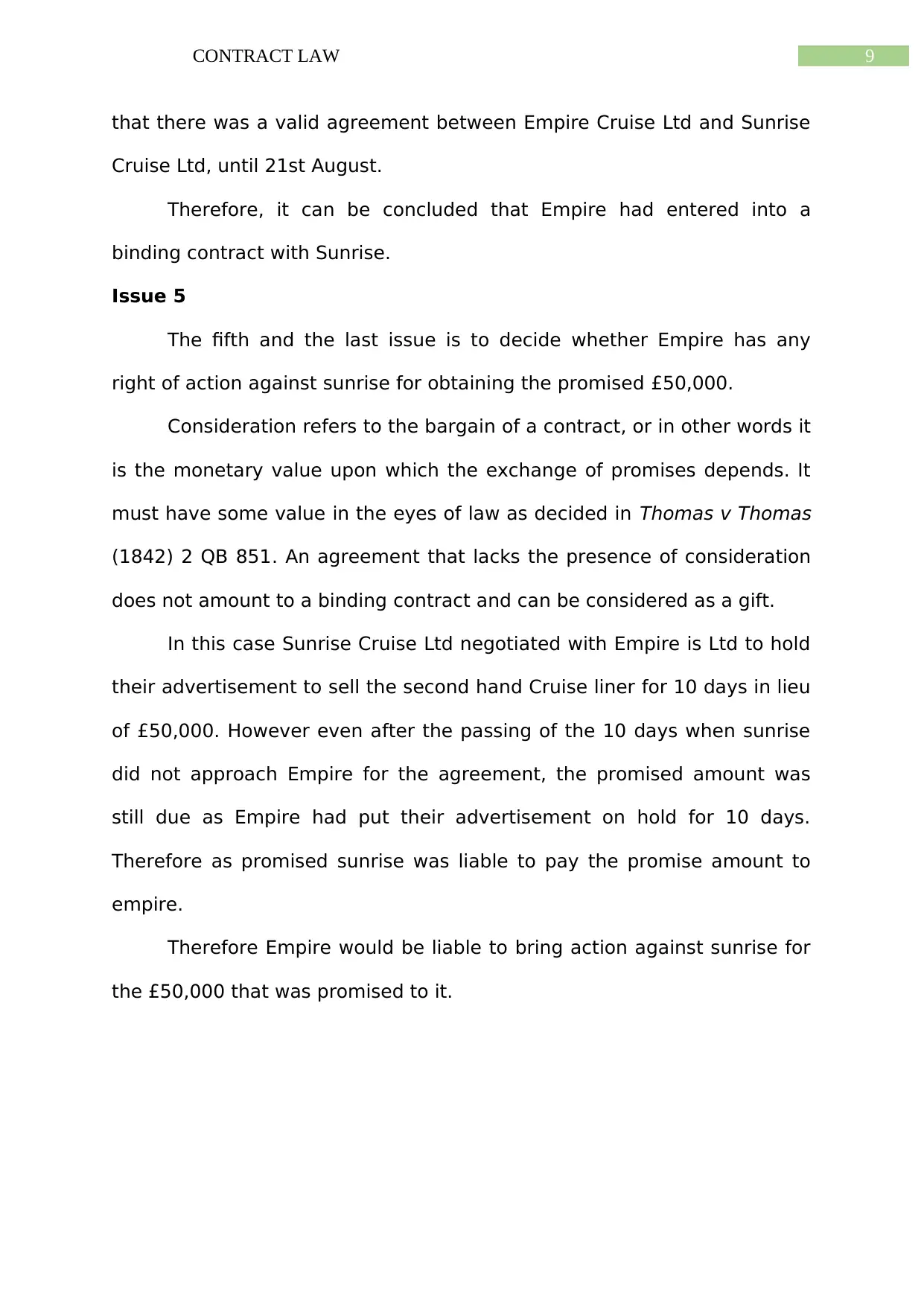
9CONTRACT LAW
that there was a valid agreement between Empire Cruise Ltd and Sunrise
Cruise Ltd, until 21st August.
Therefore, it can be concluded that Empire had entered into a
binding contract with Sunrise.
Issue 5
The fifth and the last issue is to decide whether Empire has any
right of action against sunrise for obtaining the promised £50,000.
Consideration refers to the bargain of a contract, or in other words it
is the monetary value upon which the exchange of promises depends. It
must have some value in the eyes of law as decided in Thomas v Thomas
(1842) 2 QB 851. An agreement that lacks the presence of consideration
does not amount to a binding contract and can be considered as a gift.
In this case Sunrise Cruise Ltd negotiated with Empire is Ltd to hold
their advertisement to sell the second hand Cruise liner for 10 days in lieu
of £50,000. However even after the passing of the 10 days when sunrise
did not approach Empire for the agreement, the promised amount was
still due as Empire had put their advertisement on hold for 10 days.
Therefore as promised sunrise was liable to pay the promise amount to
empire.
Therefore Empire would be liable to bring action against sunrise for
the £50,000 that was promised to it.
that there was a valid agreement between Empire Cruise Ltd and Sunrise
Cruise Ltd, until 21st August.
Therefore, it can be concluded that Empire had entered into a
binding contract with Sunrise.
Issue 5
The fifth and the last issue is to decide whether Empire has any
right of action against sunrise for obtaining the promised £50,000.
Consideration refers to the bargain of a contract, or in other words it
is the monetary value upon which the exchange of promises depends. It
must have some value in the eyes of law as decided in Thomas v Thomas
(1842) 2 QB 851. An agreement that lacks the presence of consideration
does not amount to a binding contract and can be considered as a gift.
In this case Sunrise Cruise Ltd negotiated with Empire is Ltd to hold
their advertisement to sell the second hand Cruise liner for 10 days in lieu
of £50,000. However even after the passing of the 10 days when sunrise
did not approach Empire for the agreement, the promised amount was
still due as Empire had put their advertisement on hold for 10 days.
Therefore as promised sunrise was liable to pay the promise amount to
empire.
Therefore Empire would be liable to bring action against sunrise for
the £50,000 that was promised to it.
Paraphrase This Document
Need a fresh take? Get an instant paraphrase of this document with our AI Paraphraser
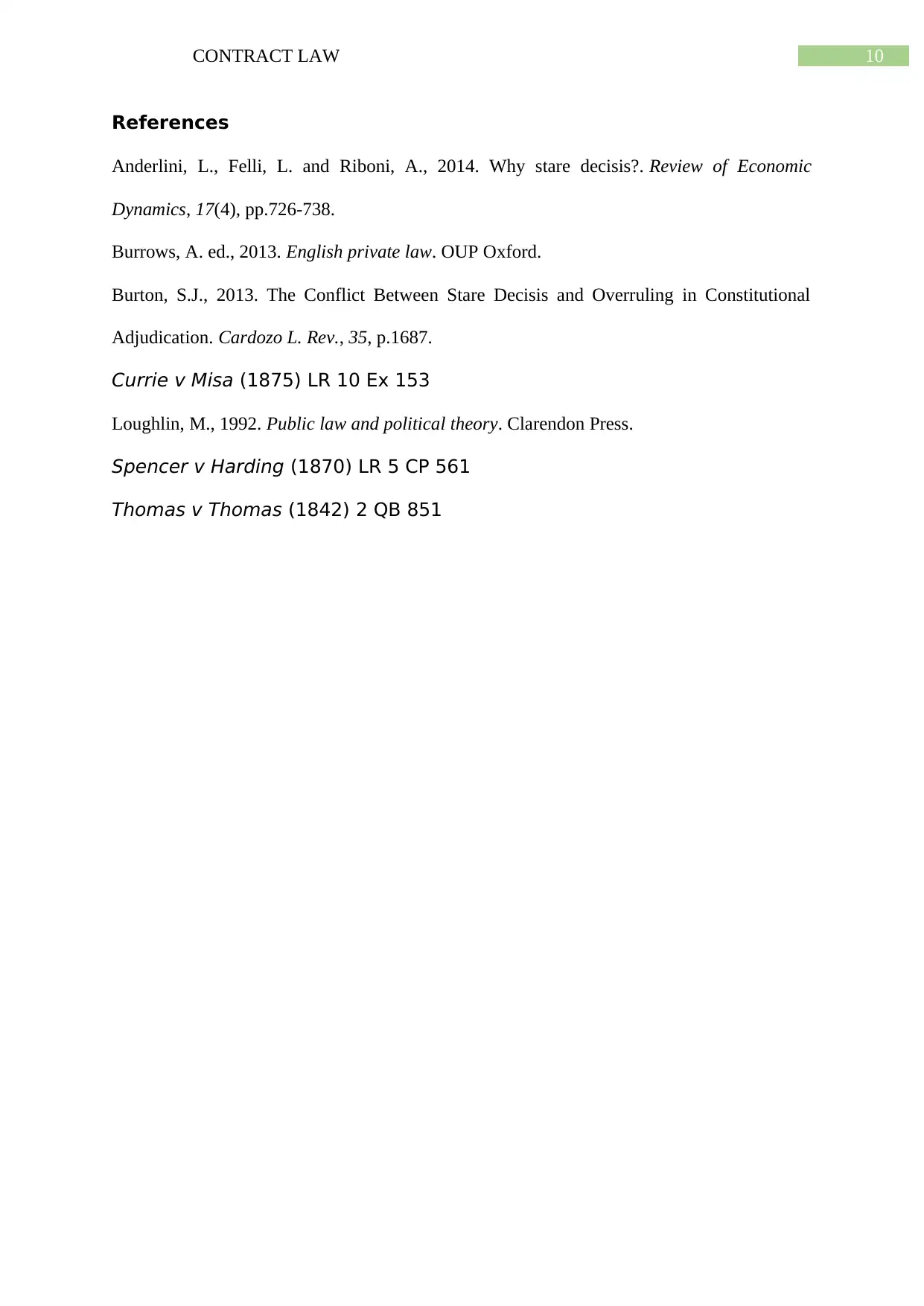
10CONTRACT LAW
References
Anderlini, L., Felli, L. and Riboni, A., 2014. Why stare decisis?. Review of Economic
Dynamics, 17(4), pp.726-738.
Burrows, A. ed., 2013. English private law. OUP Oxford.
Burton, S.J., 2013. The Conflict Between Stare Decisis and Overruling in Constitutional
Adjudication. Cardozo L. Rev., 35, p.1687.
Currie v Misa (1875) LR 10 Ex 153
Loughlin, M., 1992. Public law and political theory. Clarendon Press.
Spencer v Harding (1870) LR 5 CP 561
Thomas v Thomas (1842) 2 QB 851
References
Anderlini, L., Felli, L. and Riboni, A., 2014. Why stare decisis?. Review of Economic
Dynamics, 17(4), pp.726-738.
Burrows, A. ed., 2013. English private law. OUP Oxford.
Burton, S.J., 2013. The Conflict Between Stare Decisis and Overruling in Constitutional
Adjudication. Cardozo L. Rev., 35, p.1687.
Currie v Misa (1875) LR 10 Ex 153
Loughlin, M., 1992. Public law and political theory. Clarendon Press.
Spencer v Harding (1870) LR 5 CP 561
Thomas v Thomas (1842) 2 QB 851
1 out of 11
Related Documents
Your All-in-One AI-Powered Toolkit for Academic Success.
+13062052269
info@desklib.com
Available 24*7 on WhatsApp / Email
![[object Object]](/_next/static/media/star-bottom.7253800d.svg)
Unlock your academic potential
Copyright © 2020–2025 A2Z Services. All Rights Reserved. Developed and managed by ZUCOL.





